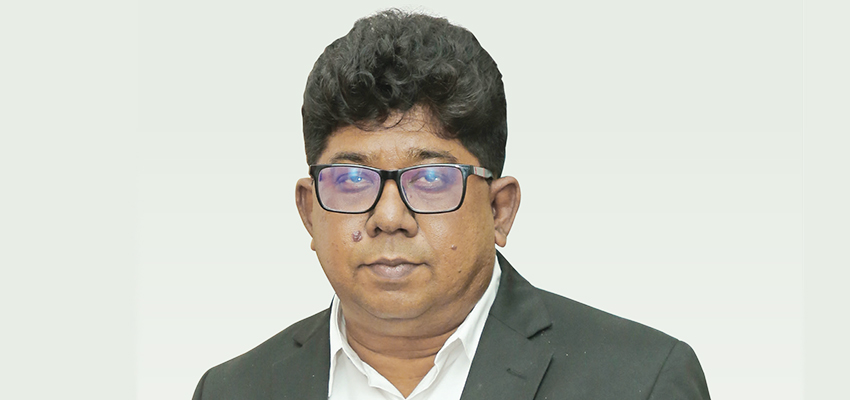Data Analytics Key to digital transformation

You need to be able to explain to businesses the necessity, approach and output of analytics in simple language, asserts Saikat Chakraborty, MD, Data Science and Analytics (Insights and Intelligence), Accenture. In an interview with Corporate Citizen, he gives insights on how analytics approach and output need to be clearly explainable to win the confidence of the intended audience. He threw light on the transformative potential of data analytics for businesses and how AI connects to analytics
"Honesty and integrity to your work, colleagues and community are your defining points. Without this, your work has no meaning"
- Saikat Chakraborty
"Students who come to do an MBA feel Maths is not for them. They have this mindset that once they get out in the field they will strategise and transform the business they are in—so data science and programming aren’t for them. This needs to change"
Corporate Citizen: Tell us about your foray into the vast and wonderful world of data. Was it something you wanted to do, or did it just happen in the course of a corporate career?

Saikat Chakraborty: When we started out, the term data science was rarely heard of. After completing my MBA, I joined Accenture Consulting and started working on supply chain analytics, especially in the area of supply chain network optimisation and then I got an offer from an US-based retailer that happened to be the second largest retailer called Target to join them in their implementation of Radio Frequency Identification Device (RFID). RFID tags are what you put on objects are of two types, active and passive. If you tag your inventory with RFID tags, they give you a wonderful visibility of supply chain—your inventory movement, the demand-supply variables etc. So, I started analysing this data and finally at the end of this exercise, they sent me to work with their data science and analytics department which was known for new innovations housed in Minneapolis, the USA at the time. The people working in that department were incredible—from Harvard and Stanford and MIT. Working with them on data science projects was an eye opener for it as it introduced me to the incredible world of Artificial Intelligence. And that’s how my journey began.
CC: A little bit about your early life and education, sir. Where are you from?
So, I am from Kolkata. I studied in the Ramakrishna Mission up to Std 10th. Then, I studied at St. Xavier’s Kolkata for my 11th and 12th, my BTech from University of Calcutta and then joined the international retailer Bata in 2000. By 2004, I felt my life and career were stuck in a routine and that’s how I decided to pursue my MBA. I resigned and studied supply chain logistics and operations and then joined Accenture Consulting. From there, I went to Target where I spent about eight years and built the entire merchandise and supply chain analytics capability from scratch. At the same time, I was pursuing the overall data science initiative—and then joined Accenture Operations from there.
CC: If you had to sum up your learnings about analytics in three points, what would they be and why?
Number One: Never stop learning. This field is changing so fast that just to keep yourself at the same level of development needs a conscious decision to study continuously. Secondly, I believe analytics can really make a difference. I have seen unbelievable impact brought in by analytics in impossible situations—provided the recommendations are applied rightly. For example, I know of this reputable and large organisation with sales going down by 3 to 5 per cent every year. All they expected was a 1.5 per cent leap out of implementation of recommendations. But when the analytics were implemented, the upward trend went up by a whopping 22 per cent!! So, this is the kind of dramatic change that analytics can bring in. Number three: In today’s world it is critical to explain the necessity of analytics in lucid and clear language, because businesspeople may not understand difficult terms. Many a time they think of it as added baggage or investment. You need to explain with examples on how analytics can be effective if you want them to buy into the idea and proceed with a proper plan and base work in place. Analytics needs a lot of explain ability and clarity.
CC: What are the qualities that a successful professional in this field would require?
Number one, a zeal to learn new things and a mindset to experiment; ability to convert ideas on paper into practical and workable solutions. Second, your ability to develop multiple alternatives and choose an optimal alternative out of all of them. See, the same problem can be approached from multiple angles. Which is the best for you? Third point to be successful in data and analytics is a hands-on approach; the willingness to get your hands dirty, as they say. I have seen that when people get into a supervisory role, they tend to believe it’s no longer necessary to work hands on; that giving instructions is enough. But that’s a mistake.
CC: What is your wish list when it comes to the education imparted at management and technical colleges.
My wishlist would be to revamp the curriculum as per the latest developments in the field. What I have found, first of all, is that the syllabus is inadequate and conventional—in many cases the topics under discussion are no longer front and center. Plus, much of the faculty that teaches data and analytics have no idea what is happening in the industry. They come from a statistics background and often with inadequate industry exposure so you cannot teach them what industry is looking for in a student if you are purely from an academic background of statistics. You need hands on experience in the field. Last but not the least, students who come to do an MBA feel Maths is not for them. They have this mindset that once they get out in the field they will strategise and transform the business they are in—so data science and programming aren’t for them. This needs to change.
CC: How rewarding is a career in analytics? What does it take for a professional to succeed?
It is tremendously rewarding. To succeed in an organisation, you need a buddy and a mentor. While a mentor will take you through the corridors and guide you on the nuts and bolts on how the system works, the buddy will acquaint you with the intimate details on the things you need to solve problems. This will make your life easier.
CC: Apart from work, how do you unwind?
I reserve about two hours a day for studying the latest trends in data science and non-fiction topics of interest—such as quantum mechanics and astronomy. Other than this, I play chess and listen to music. Pink Floyd, Nirvana etc. are my passion.
CC: Tell us about your family. Where are you based currently?
It’s a small unit in Mumbai with my wife and two kids and our golden retriever.
CC: What’s the philosophy you live and work by?
Honesty and integrity to your work, colleagues and community are your defining points. Without this, your work has no meaning. To drive home this point, my father gave me advice on the first day of work. He told me, in no uncertain terms, as I bent to touch his feet, that if I compromised on the principles, he had inculcated in us, I was to stop writing his name alongside mine. That memory stayed on in mind.